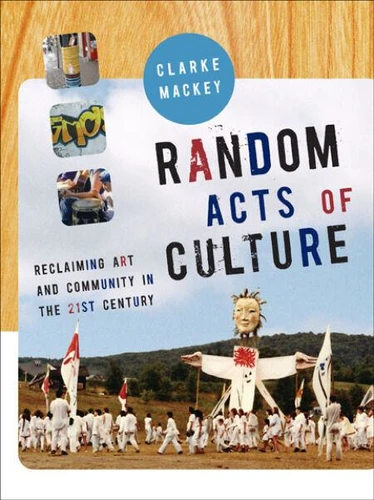Random Acts of Culture. Reclaiming Art and Community in the 21st Century
Par :Formats :
Disponible dans votre compte client Decitre ou Furet du Nord dès validation de votre commande. Le format ePub est :
- Compatible avec une lecture sur My Vivlio (smartphone, tablette, ordinateur)
- Compatible avec une lecture sur liseuses Vivlio
- Pour les liseuses autres que Vivlio, vous devez utiliser le logiciel Adobe Digital Edition. Non compatible avec la lecture sur les liseuses Kindle, Remarkable et Sony
 , qui est-ce ?
, qui est-ce ?Notre partenaire de plateforme de lecture numérique où vous retrouverez l'ensemble de vos ebooks gratuitement
Pour en savoir plus sur nos ebooks, consultez notre aide en ligne ici
- Nombre de pages286
- FormatePub
- ISBN978-1-926662-31-2
- EAN9781926662312
- Date de parution15/10/2010
- Protection num.Digital Watermarking
- Taille563 Ko
- Infos supplémentairesepub
- ÉditeurBetween the Lines
Résumé
In our society, cultural activity-or the arts-usually refers to the high culture of the elites and popular mass culture. Clarke Mackey argues for a third category that is as old as human society itself but seldom discussed: vernacular culture. Vernacular culture comprises all those creative, non-instrumental activities that people engage in daily, activities that provide meaning in life: conversations between friends, social gatherings and rituals, play and participatory sports, informal storytelling, musical jam sessions, cooking and gardening, homemade architecture, and street festivals.
In this lively and eclectic discussion, Mackey maintains that practising and celebrating such activities at the expense of passive, consumer culture have far-reaching benefits. Mackey further examines how literacy, imperialism, industrialization and electronic technologies have produced a culture of spectatorship, apathy and powerlessness. This is a timely, considered, and provocative response to the popularity of amateur, participatory, and do-it-yourself culture available on the internet.
In this lively and eclectic discussion, Mackey maintains that practising and celebrating such activities at the expense of passive, consumer culture have far-reaching benefits. Mackey further examines how literacy, imperialism, industrialization and electronic technologies have produced a culture of spectatorship, apathy and powerlessness. This is a timely, considered, and provocative response to the popularity of amateur, participatory, and do-it-yourself culture available on the internet.
In our society, cultural activity-or the arts-usually refers to the high culture of the elites and popular mass culture. Clarke Mackey argues for a third category that is as old as human society itself but seldom discussed: vernacular culture. Vernacular culture comprises all those creative, non-instrumental activities that people engage in daily, activities that provide meaning in life: conversations between friends, social gatherings and rituals, play and participatory sports, informal storytelling, musical jam sessions, cooking and gardening, homemade architecture, and street festivals.
In this lively and eclectic discussion, Mackey maintains that practising and celebrating such activities at the expense of passive, consumer culture have far-reaching benefits. Mackey further examines how literacy, imperialism, industrialization and electronic technologies have produced a culture of spectatorship, apathy and powerlessness. This is a timely, considered, and provocative response to the popularity of amateur, participatory, and do-it-yourself culture available on the internet.
In this lively and eclectic discussion, Mackey maintains that practising and celebrating such activities at the expense of passive, consumer culture have far-reaching benefits. Mackey further examines how literacy, imperialism, industrialization and electronic technologies have produced a culture of spectatorship, apathy and powerlessness. This is a timely, considered, and provocative response to the popularity of amateur, participatory, and do-it-yourself culture available on the internet.



